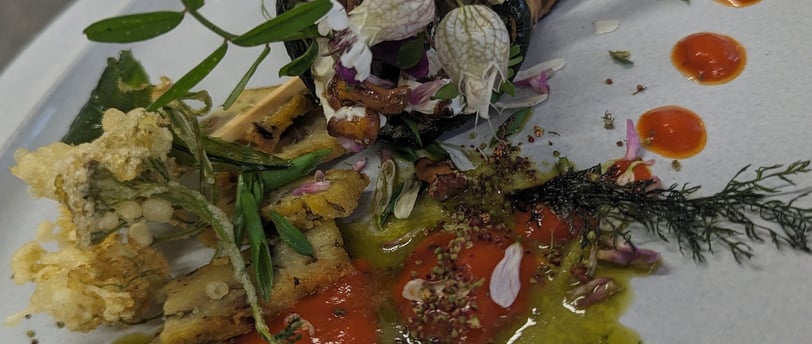The practice of Regenerative Hospitality
A short study on what ingredients are needed to perform hospitality in a way that is regenerative - not only in operational environmental and social impact, but in employee/colleague resilience, growth and vibrancy.
2/22/20244 min read


The overall stance of hospitality is service, whether kitchen, front of house or back office. As we all know, being in service is not easy, and working in the service industries can often lead to burnout. This opens up the question of 'how can this be done in a way that is not only sustainable, but regenerative?' Because looking around, the world needs more than just sustainability - environmentally, socially, and economically. Environmentally this means operating in ways which put back into and heal the environment; socially this means creating spaces where people can connect, grow and find meaning; and economically - well the magic is, whilst sustainability often means working within limits, regeneration actually means/is growth.
I have recently been co-exploring the topic of mindfulness as a core component of being regenerative. Aside from questions around different ways to practice being mindful, I would like to explore the approach: 'one's whole life - every moment is the practice'.
A constant theme in hospitality is the emotional labour of handling one's own emotions whilst confronted by the needs of others: the outward gestures of being hospitable may not always be in alignment with what may be going on inside - that is a key feature of our work. At that moment, how do we deal with it?
These thoughts apply to regenerative hospitality overall, but as my experience is predominantly in the kitchen, I will focus there.
There are many aspects to creating a meal that are strong teachers - the crucible of the kitchen is one of the very best ‘arenas for development’ that modern life has to offer.
From the outset being mindful is key, especially if one wants to align with principles such as regeneration. Whether consciously creating the idea around a theme, festival or occasion; tuning into season and local terroir (spirit of place) or what needs using, or forming ideas around the dietary needs of the guests, one is called to brig a great many aspects to mind - and to do it in a timeframe that is absolute (and the goalposts ay shift quite late on in the day).
Then there is the cooking process itself - from how the ingredients are chopped, preserved, transformed or featured, to how the people cooking are working together, how they deal with the unexpected, and how harmoniously they combine knowledge and flow as a team.
The ‘secret’ ingredient of good cooking is, cliche or not - love. Only doing it for the love of it enables one to find the energy required to become harmoniously creative. Like the Buddhist sand mandala practice - sometimes days of work go into a display that gets destroyed in seconds - being attached just isn’t an option with food. One finds in time that this becomes quite liberating - if one can focus on these aspects and not what can be complained about - for that endeavour, is given ample material to build upon, if that’s where the focus is applied.
And rinse and repeat. Chop wood carry water. You get to try again and again to not focus on what goes wrong (for plenty can and does), to look beyond the difficulty of your lot, to not react but respond to challenging behaviours, and to form boundaries when faced with disrespect. Food and lodging are such fundamental aspects of life that they often bring out that which is most needy in people - from the point of view of development, this translates as very fertile ground.
One has to in one sense become a soldier, developing ‘anti-fragility’ to the turbulence of playing in the field of service and meeting needs, and getting things done - on time. And the above is only what the immediate situation demands.
On top of that we get asked how do I take care of myself so that I can maintain such a practice? How do I find balance? How do I create joy with how I do what I do?
Somehow a deep professionalism (meant as in truly caring about the quality of one's work) - being completely serious about what one does on a core level, frees up and energises the soul to begin experiencing work as play. And one may find, a couple of decades later, that this has enabled the learning and development of faculties that look very much like what spiritual practice is purposed to enable us to learn.
If regeneration is taken to mean the generation of more than what is put in, it may become apparent that doing difficult work with love and presence, when it is known to be in service of something worthy, is regenerative. This is my experience working with Hofgut LEO. https://hofgutleo.de
Gratitude seems to be a core practice for people involved with this regenerative-cooperative - and experience strongly suggests that complaining is one of the biggest or most common obstacles to realising what I have attempted to describe above.
We seem to have adopted a theme song for this phase of the organisation - 'Give thanks every day' by Reemah https://www.youtube.com/watch?v=9aY3NifWiyI
Without this, I am not sure where one could find the energy to sustain what we do.
Of course, if the situation or place isn't right, then these experiences may be very different. But there is enough of a concrete phenomenon shared by enough people for me to want to try and write about it.
I invite you the reader to offer any comments should any thoughts arise from the question 'what is being regenerative?' - personally, organisationally, environmentally, socially and/or spiritually.
Originally posted on Linkedin: https://www.linkedin.com/pulse/practice-regenerative-hospitality-melvin-jarman-68ebe/?trackingId=rK%2FuA9jeRRaywUSHQvIi4A%3D%3D
